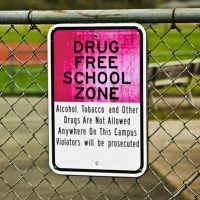If You Are In Florida, You Are Probably In A Drug-Free Zone

Mandatory minimum sentences for drug offenses account for many of the cases where defendants are serving long prison sentences for nonviolent crimes. While sentencing reform and cannabis decriminalization have decreased the number of new cases that result in long prison sentences for drug crime convictions, Florida law imposes a three-year mandatory minimum prison sentence in cases where a defendant is convicted of the delivery, sale, manufacture, or possession with intent to deliver of controlled substances in a place designated as a drug-free zone. The trouble is that Florida defines drug-free zones so broadly that, in populous areas, prosecutors can apply the drug-free zone laws almost anywhere, even in places that even the most naïve people would never think to describe as drug-free zones, such as some nightclubs and motels. If you are being accused of selling drugs in a drug-free zone, contact a Tampa drug crime lawyer.
The Many Drug-Free Zones in Florida
Most people would agree that more lenient sentences are appropriate for drug crimes that occur when children and other vulnerable people are not present than for drug crimes that occur when such people are present. This is the rationale behind drug-free zones; they are places frequented by people that Florida law wants to take special care to protect from drug-related violence. Florida designates the following places as drug-free zones:
- Elementary, middle, and high schools
- University campuses
- Public parks
- Community centers
- Assisted living facilities
- Daycare centers and preschools
- Public housing facilities
- Convenience stores and gas stations that are open 24 hours and that sell food
The drug-free zone laws apply not only to drug crimes that take place on the premises of these designated places, but also drug crimes that occur within 1,000 feet of them. An exception is that the vicinity of a school only counts as a drug-free zone between 6:00 a.m. and midnight.
The mandatory minimum sentence for drug-free zones only applies when the defendant is convicted of drug trafficking, possession with intent to deliver, or the sale, manufacture, or delivery of controlled substances. It does not apply in cases of simple possession. Snorting cocaine in a pavilion at a public park is no more and no less illegal than snorting cocaine in the champagne room of a strip club located more than 1,000 feet from the nearest 24-hour gas station.
The fairness of drug-free zones is debatable. In densely populated urban neighborhoods, everywhere is a drug-free zone. Selling two Adderall pills in an impoverished neighborhood where everywhere is a stone’s throw from a public housing facility and where 24-hour convenience stores are abundant but full-fledged supermarkets are absent yields a harsher sentence than selling two Adderall pills in a gated community. No matter what drug crime you are accused of and where you are accused of doing it, you have the right to the presumption of innocence and to representation by an attorney.
Contact Tampa Criminal Defense Attorney Bryant Scriven
A criminal defense lawyer can help you if you are facing criminal charges for selling controlled substances in a drug-free zone. Contact Scriven Law in Tampa, Florida to schedule a consultation.
Source:
sentencingproject.org/app/uploads/2022/08/Drug-Free-Zone-Laws.pdf

